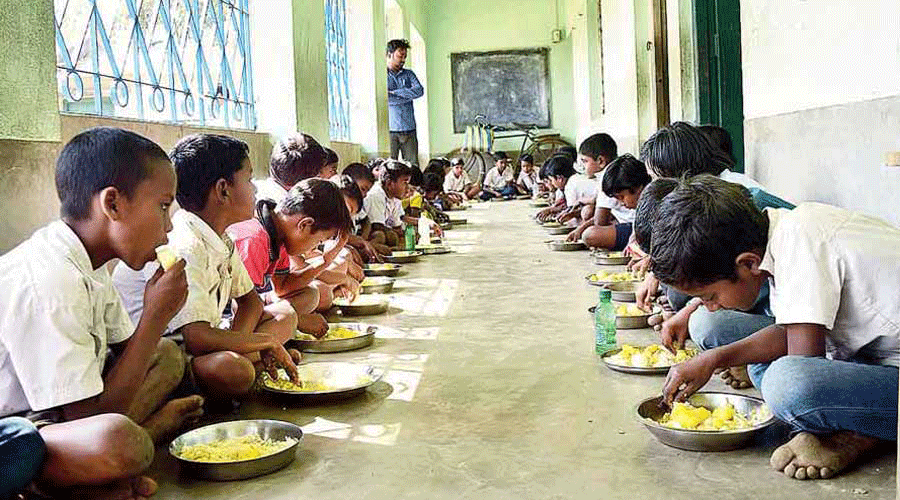The midday meal scheme for schoolchildren has received a reduced allocation in the budget, compared with the revised allocation last year, despite an increase in enrolment at government schools.
“This will affect both the quality and the quantity of food served in the schools. How can the schools manage otherwise?” said Ashok Rao, a social activist associated with the NGO Swami Sivananda Memorial Institute, which supplies food to Anganwadi centres in Delhi.
The PM-Poshan scheme, earlier known as the Mid Day Meal programme, has been allocated Rs 11,600 crore for 2023-24, down from the revised allocation of Rs 12,800 crore in 2022-23.
The overall allocation for the education sector has risen from Rs 1.04 lakh crore in 2022-23 to Rs 1.13 lakh crore.
Nearly 10 crore children, enrolled in Classes I to VIII, get a free meal at lunchtime at about 11 lakh government schools on the days the schools are open.
According to multiple studies, the scheme has been able to address classroom hunger, enhance the children’s concentration on the lessons, and increase enrolment. Rao said the allocation should have been enhanced since enrolment in government schools has increased.
“The number of students has increased in government schools mainly because of the reduced economic standards of the parents,” he said.
“The real income of people, particularly the working class, has gone down. The government should ideally have strengthened the scheme.” According to the recently released Annual Status of Education Report 2022, the enrolment rate of children aged 6 to 14 (at government schools) rose from 65.6 per cent in 2018 to 72.9 per cent in 2022. The budget allocation for the midday meal programme was Rs 10,234 crore in 2022-23 but was increased to Rs 12,800 crore in the revised budget.
“The allocation was increased because of the need. The allocation for this year should have stuck to the revised budget, at least,” Rao said.
A response is awaited to an email sent to school education secretary Sanjay Kumar seeking his department’s perspective on the subject.
The school education sector has got Rs 4,000 crore for the PM School for Rising India (PM-SHRI) scheme, which aims to create more than 15,000 schools of excellence in over 7,000 blocks.
These schools will be expected to provide quality education in an inclusive and joyful environment, serving as models for other schools in their areas. The higher education sector has received Rs 44,094 crore against the Rs 40,828 crore allocated last year.
The allocation for the IIMs has been cut drastically from Rs 653 crore last year to Rs 300 crore.
Finance minister Nirmala Sitharaman said 100 labs would be set up at engineering institutions to develop applications using 5G services, covering smart classrooms, precision farming, intelligent transport systems, and health care applications.
A National Digital Library will be set up for children and adolescents.











